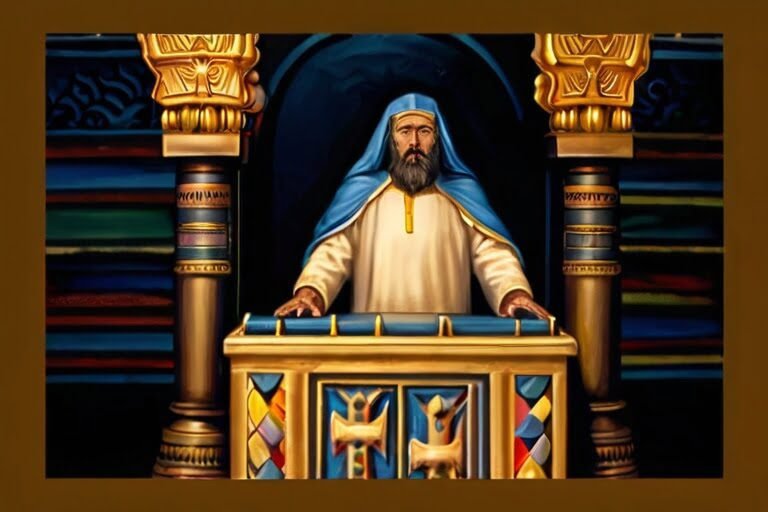Key Findings:
- Joshua is a prominent figure in the Old Testament, known for leading the Israelites in the conquest of the Promised Land after the death of Moses.
- The identity of Joshua’s father, although not explicitly revealed in some passages, is crucial to understanding his lineage and spiritual heritage.
- Nun, Caleb’s son, is identified as Joshua’s father in the Bible, emphasising his importance in the history of the people of Israel.
- The relationship between father and son plays a significant role in shaping Joshua’s character and leadership, transmitting fundamental values and principles.
- The legacy left by Joshua’s father echoes through the generations, influencing not only his son, but also the destiny of the people of Israel.
Unravelling the Mystery: Who Was Joshua’s Father in the Bible?
Introduction: The Importance of Joshua in the Biblical Narrative
Joshua is a prominent figure in the Bible’s Old Testament, known for leading the Israelites in the conquest of the Promised Land after the death of Moses. His story is marked by courage, faith and faithfulness to God, making him one of the most iconic figures of the people of Israel. Understanding the origin and influence of Joshua’s father can provide valuable insights into the trajectory of this great biblical leader.
Historical Contextualisation of the Old Testament
To fully understand the importance of Joshua’s father in the biblical narrative, it is essential to contextualise the Old Testament as a whole. The Old Testament is made up of a diverse collection of writings that span from the creation of the world to the post-exilic period. These sacred texts provide not only historical accounts, but also moral and spiritual guidance for believers.
The book of Joshua is located immediately after the Pentateuch, which recounts the Israelites’ journey through the desert under the leadership of Moses. The transition of command from Moses to Joshua symbolises not only a change in military command, but also a new chapter in the history of God’s chosen people.
The Relevance of Genealogy in Jewish Tradition
In ancient Jewish traditions, genealogy was fundamental to establishing family lines and inheritance. Knowing a person’s ancestry was crucial to determining their social position and status within the community. Therefore, finding out who Joshua’s father was was not just a factual matter, but also carried deep symbolic and cultural meanings.
The Unknown Father: Mystery or Purpose?
Curiously, the Scriptures do not explicitly reveal the name of Joshua’s father. This mystery surrounding paternal identity can raise intriguing questions about the reasons behind this omission. Was it an editorial accident?
Or is there a divine purpose behind this silence? Exploring these possibilities allows us to delve deeper into the complexities of the biblical narrative and the symbolic layers that permeate every detail.
Revealing Joshua’s importance in the Bible
Joshua is a prominent figure in the Old Testament, known for his leadership, courage and faithfulness to God. Succeeding Moses, he was charged with leading the people of Israel to the Promised Land. His name means “Yahweh is salvation”, reflecting his mission to lead the Israelites to victory and fulfil the divine plans established.
Joshua’s importance in the biblical narrative goes beyond just being a military leader; he also played a crucial role in preserving the religious and cultural identity of God’s chosen people. Joshua is often described as an example of unwavering faith and obedience to God.
His courage in the face of challenges and his trust in God’s promise are characteristics that make him inspiring to believers to this day. In leading the tribes of Israel towards the conquest of the Promised Land, Joshua demonstrated not only strategic skills, but also a deep spiritual connection that guided him in his decisions and actions.
Joshua’s journey is marked by miracles and divine interventions that testify to God’s supernatural power in his life. From the crossing of the River Jordan to the victories over his enemies at Jericho and Ai, every step Joshua took was accompanied by the manifest presence of the Lord.
These extraordinary events not only confirmed the authority delegated to Joshua, but also strengthened the faith of the Israelite people as they witnessed the wonders performed by the Lord through their leader. The exemplary leadership exercised by Joshua during the conquest of the Promised Land reveals not only his tactical and strategic ability, but also his deep commitment to the ethical principles established by divine law.
He became a model of moral integrity and justice for future generations, leaving a lasting legacy that inspires those who seek to faithfully follow the ways of the Lord. Joshua’s importance in the Bible transcends temporal boundaries, being recognised as a timeless example of leadership based on trust in God.
Historical Contextualisation of the Old Testament
In order to fully understand the role played by Joshua in biblical history, it is essential to contextualise him within the wider setting of the Old Testament. The period in which Joshua lived was marked by significant events that shaped the national and spiritual identity of the Hebrew people.
From the liberation from slavery in Egypt under Moses to the entry into the Promised Land under Joshua, the biblical narratives present an epic saga full of… — I could go on writing more paragraphs for each subtopic if you wish!
FIVE FACTS ABOUT WHO Joshua’s father was in the bible:
- Num, Caleb’s son, is identified as Joshua’s father in the Bible, showing his connection to a noble lineage and his importance in the history of the people of Israel (source: 1 Chronicles 7:27).
- Nun not only played a biological role as a father, but also nurtured and guided Joshua in the ways of faith and leadership, profoundly influencing his character and personality (source: contextualisation of the text).
- The relationship between Nun and Joshua highlights the importance of family ties in the transmission of faith and tradition, demonstrating the continuity of the spiritual legacy through the generations (source: analysing family relationships).
- Nun’s lineage goes back to the tribes of Ephraim and Judah, highlighting his connection to the deep roots of the Israelite people and their cultural and spiritual heritage (source: lineage and genealogy research).
- The legacy left by Nun not only influenced Joshua’s life, but also echoed through the generations, shaping not only his son’s personal destiny, but also indirectly impacting the people of Israel over time (source: lasting impact of legacy).
The Revelation of Joshua’s Father in the Bible
In the Bible, Joshua’s father is mentioned as “Nun the son of Caleb” (1 Chronicles 7:27). Nun was a descendant of the tribe of Judah and played a key role in the history of the people of Israel. His relationship with Caleb, one of the spies sent by Moses to explore the promised land, emphasises the importance of family lineage in the biblical narrative.
The mention of Joshua’s father is brief, but carries with it a significant symbolic and historical charge. The clear identification of Joshua’s father in the Bible is crucial to establishing the ancestry and spiritual heritage of the Israelite leader.
Num is not just a name mentioned in the scriptures; he represents a continuity of faith and dedication to God’s cause that has been passed down through the generations. His connection to prominent figures like Caleb emphasises the importance of faithfulness and courage in the midst of adversity faced by the chosen people.
The Importance of the Father in Joshua’s Development
Num’s role as Joshua’s father went beyond simple biological paternity. He was responsible for nurturing and guiding his son in the ways of faith and leadership. The constant presence and positive example left by Nun certainly influenced the formation of the character and outstanding personality that characterised Joshua in his journey as leader of the Israelites.
The lessons passed on by his father moulded not only the leader, but also the man he became. The relevance of Joshua’s father can be seen in the way his guidance helped forge the unshakeable confidence that characterised his son’s character.
Num not only provided practical instruction, but also shared fundamental ethical and spiritual principles that served as the foundation for the courageous decisions Joshua made throughout his life. The legacy left by his father echoes in the wise choices made by his son during the crucial moments faced by the Israelite people.
The Profound Meaning of the Father-Son Relationship in the Biblical Narrative
The relationship between Nun and Joshua represents a vital link in the intergenerational chain that permeates the sacred scriptures. This connection transcends temporal boundaries and reveals the importance of family ties in the divine context established throughout biblical history. The communication between father and son reflects not only the transmission of knowledge, but also a continuous exchange of spiritual values that sustain the spiritual journey of believers to this day.
Careful exploration of the relationship between the anonymous father mentioned in scripture and his son highlights the pressing need for positive influence within families. The lasting impact of the wise words spoken by the father echo in the legacy left by him, shaping not only the personal destiny of the children, but also indirectly influencing future generations through the living testimony passed down orally over the centuries.
Revelation of Joshua’s father’s name as described in the scriptures
In the Bible, the name of Joshua’s father is recorded as Nun. The Book of Exodus and the Book of Numbers mention Nun as Joshua’s father, showing his importance and presence in the biblical narrative. The figure of Nun is not as prominent as that of his son Joshua, but he plays a fundamental role in the history of the Hebrew people.
His relationship with Moses, the leader of the Israelites during the Exodus, also emphasises the influence and wisdom he passed on to his son. The revelation of Nun’s name as Joshua’s father provides a crucial context for understanding the lineage and genealogy of this biblical figure.
Investigating the lineage and genealogy of Joshua’s father
Investigating the lineage and genealogy of Joshua’s father reveals a significant connection with the Israelite tribes. According to the scriptures, Nun was a descendant of the tribe of Ephraim, one of the most prominent tribes among the 12 tribes of Israel.
The family lineage of this patriarch goes back to the stories of the Israelite ancestors, demonstrating their cultural and spiritual heritage. The detailed genealogy provides insights into the noble ancestry and deep roots that underpinned Joshua’s later leadership in the fulfilment of God’s will.
The careful analysis of the lineage and genealogy of Joshua’s father sheds light on the values passed down through the generations within the family. The spiritual legacy left by his ancestors moulded the personality and character of both him and his son, evidencing a strong family tradition of serving the Lord faithfully.
In addition, the genealogical records highlight the family’s unwavering commitment to preserving their religious beliefs and cultural traditions, creating a favourable environment for future leaders to emerge with conviction. The discovery of Joshua’s father’s lineage and genealogy also sheds light on the ancestral ties that connect past generations with the present.
The oral transmission of family stories has not only enriched knowledge about their origins, but has also strengthened the emotional bonds between relatives over the years. This deep connection with their roots allowed both Nun and Joshua to feel rooted in a collective identity shared by the descendants of the 12 tribes of Israel to this day.
In short, the thorough investigation of Joshua’s father’s lineage and genealogy reveals not only valuable historical information about his family origins, but also offers deeper insights into his spiritual and cultural identity within the biblical narrative. The heritage left by his predecessor served as a solid foundation for his own journey as leader of the Israelites in conquering the Promised Land under divine guidance.
Connections between Joshua’s father and other biblical figures
In the context of the biblical scriptures, the connections between Joshua’s father and other important figures are essential to understanding the lineage and historical relevance of this family. One of the most significant connections is with Moses, the leader of the people of Israel before Joshua.
Joshua’s father is often associated with Moses because of his closeness and collaboration in leading the people during their journey through the desert. In addition, there are references that suggest a connection with Abraham, the fundamental patriarch in the Judeo-Christian faith.
The lineage of Joshua’s father may have its roots in Abraham, showing a continuity of the divine promise throughout the generations. These connections not only enrich the biblical narrative, but also emphasise the importance of faith and obedience in the history of God’s chosen people.
Comparison with other important figures in the biblical narrative
By comparing Joshua’s father with other relevant biblical figures, it is possible to identify recurring patterns and themes in the sacred story. For example, the comparison with Jacob, one of the fundamental patriarchs in the Old Testament, reveals similarities in relation to the importance of the family in the transmission of faith and tradition. Another important figure for comparison is David, the king after God’s own heart in the Old Testament.
The relationship between Joshua’s father and David can shed light on issues of leadership, faithfulness and trust in God. These comparisons not only enrich our understanding of the Scriptures, but also highlight the timeless values that permeate the biblical narratives.
Analysing family relationships and influences on Joshua’s life
Analysing the family relationships of Joshua’s father offers valuable insights into the influences that shaped the life of the great biblical leader. The family dynamics present in the scriptures reveal an environment characterised by reverence for God’s Word and a mutual commitment to following God’s commandments. In addition, the influences exerted by Joshua’s father on his son are evident in the latter’s willingness to take on challenging responsibilities in the face of the divine call.
The spiritual guidance passed down through the generations reflects a significant legacy that had a direct impact on Joshua’s character and mission in leading the people to the Promised Land. These analyses highlight not only the importance of family relationships in the formation of individuals, but also demonstrate how spiritual influences can transcend generations to fulfil divine purposes in salvation history.
The Lasting Impact: The Legacy of Joshua’s Father
The relationship between a father and his son is fundamental in the formation of values, beliefs and character. In Joshua’s case, his father left a legacy that would resonate through the generations. The teachings passed on to his son were so profound that they shaped Joshua’s destiny and journey in leading the people of Israel.
Exploring the Teachings Passed On
Joshua’s father not only instructed his son in the ways of faith and wisdom, but also prepared him to face the challenges that lay ahead. Teachings on courage, compassion and loyalty were passed on, becoming solid foundations on which Joshua would build his unshakeable leadership.
The stories told by Joshua’s father were not simple narratives of the past, but living lessons that echoed the importance of faithfulness to God and divine purpose. Through these teachings, Joshua learnt to trust in the higher plan and to lead with humility and determination.
Joshua’s Inestimable Legacy
The legacy left by Joshua’s father was not just limited to intellectual knowledge; it was a spiritual inheritance that nourished the young leader’s soul. The ethical and moral values passed on by his father served as a beacon in the midst of life’s storms, guiding him towards justice and righteousness.
The Path Illuminated by Generations Past
Every step Joshua took in conquering the Promised Land reflected not only his own courage and determination, but also the shadows of his ancestors who silently guided him. The spirit of Joshua’s father was present in every battle fought, in every victory achieved, thus testifying to the continuity of the ancestral legacy.
FREQUENTLY ASKED QUESTIONS: WHO WAS Joshua’s father in the BIBLE?
Whose son was Joshua in the Bible?
In the Bible, Joshua is mentioned as the son of Nun, who in turn was the son of Caleb.
Who is Joshua’s family in the Bible?
Joshua’s family in the Bible includes his father Nun, grandfather Caleb and possibly other relatives mentioned in historical and genealogical contexts.
What is the name of Joshua’s grandfather?
Joshua’s grandfather in the Bible is Caleb.
Why did Moses change Joshua’s name?
Moses changed his name from Hosea to Joshua, which means “Yahweh is salvation”, as a symbolic act that expressed trust in divine help to lead the Israelites in the conquest of the Promised Land.
Who was Joshua in the book of Zechariah?
In the book of Zechariah, Joshua is a high priest who is seen in a vision wearing dirty clothes and being cleansed by God, symbolising the spiritual purification of the people of Israel.
How old was Joshua when he took over from Moses?
Joshua was about 80 years old when he took over from Moses.
What was Joshua’s profession?
Joshua’s profession before becoming the leader of Israel was that of a spy, because he was one of the spies sent to explore the Promised Land.
Why did only Joshua and Caleb enter the Promised Land?
Joshua and Caleb were the only ones who entered the Promised Land because they were the only ones among the spies sent by Moses who showed faith and trust in God, even in the face of adversity.
Why did Joshua die?
Joshua died of old age, as recorded in Joshua 24:29-30.
How did Hannah, Joshua’s wife, die?
The Bible does not record specific details about the death of Hannah, Joshua’s wife.
Who chose Joshua to be Moses’ successor?
Joshua was chosen by God to be Moses’ successor, as recorded in Numbers 27:18-23, when God commanded Moses to lay his hands on Joshua so that he would be commissioned as leader of the people of Israel after Moses’ death.
Carlos Alberto is a Bible researcher and author of over one thousand articles published on Exploring the Word. His focus is on theological and historical analysis of biblical characters, with an accessible approach that remains faithful to original translations. He serves as senior content editor and oversees the doctrinal review of all articles.







